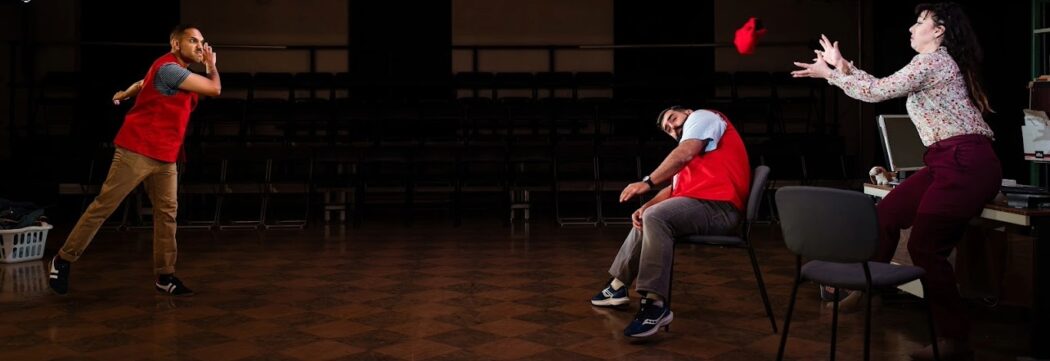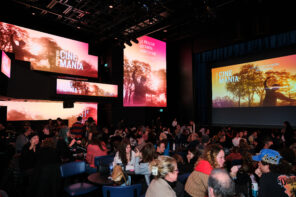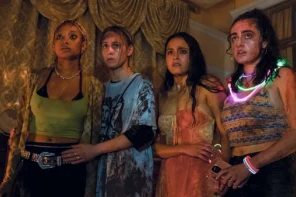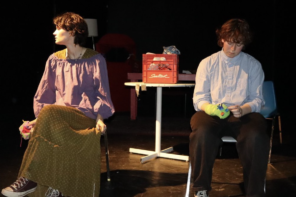Under blue fluorescent lights, two men slowly circle one another, crouched like animals ready to pounce. Their arena is the shabby yellow-walled office of chain thrift store ‘Better Bargains.’ Each wears a cheery red vest with a nametag. On a galaxy-print poster behind them, orange and teal text reads: “Keep Calm and Be Different.” The door behind them opens. Their manager walks in, the official arbiter of their duel. She has them stand back-to-back, take five slow paces, and, “at my word,” fire! The thunder-clap of finger-guns breaks the spell of sporting combat. The fluorescent lights assume their nauseating yellow hue, and they are returned to the world of bulletin boards, used clothes, and the crackling intercom. The long sparring match of White Lion, Brown Tiger has only just begun.
Tiffany is mediating what seems to be a petty spat between her employees: Lesantha, a Sinhalese Sri Lankan who grew up in Montreal, and Rishan, a Tamil Sri Lankan who recently immigrated to Canada. The inter-ethnic tensions of the Sri Lankan Civil War still simmer between them, but so do their warring ideas of minority-status in Canada. “Every stereotype has a grain of truth,” Lesantha spits at Rishan when they’re alone. “You’re that grain.”
Their white manager (whose cultural heritage includes “an Irish pub crawl in college”) masks her own racism with do-good slogans. “We believe in diversity in the workplace,” she says to them. “That’s why you’re here.” Confusing mediation with meditation, she insists that the two men sit on a yoga mat until they “work through this.”
Though they appear to respect her authority, it might only be “ass-kissing” or “brown-nosing.” Both men speak derisively of Tiffany’s whiteness—and her female body—as soon as she leaves the room.
A tense tight-rope walk between humour and offense, the play is a kaleidoscope of shifting allegiances. It is never clear who is to blame: each character is arguably the victim. Each, in turn, is also the villain, the co-conspirator, the co-defendant, and the witness. The play is a messy triangulation of power, oppression, and resentment.
Though their witty back-and-forths might hog your attention, it was the bodily acting of the performers that most impressed me … When alliances start to shift, you can feel the rearrangement.
Written by Vishesh Abeyratne, White Lion, Brown Tiger is the first Sri Lankan-Canadian play produced in Montreal. Directed by Michelle Soicher, it premiered at the Teesri Duniya theatre on October 14th. The play uses what’s called a ‘traverse’ or ‘alley’ stage, and the audience is split into two bleachers on either side of a rectangular set. I unknowingly sat beside Soicher, who was “off-duty” as director that night. She expressed her excitement at seeing the faces of the other half-audience across the set: “I want to watch people watch it.”
As I entered the theatre, I encountered a Better Bargains bulletin board complete with company pamphlets (the disguised programs). There were entries to the left and right, but no signage to direct me. I turned right, and realized I had chosen my seat, my own angled view of the play. White Lion, Brown Tiger, I would learn, tempts you to takes sides but never privileges one over the other.
Better Bargains is uncanny in its representation of run-down suburban thrift superstores, like Value Village. The set looks casually strewn and under-maintained thanks to unbelievably precise choices by designer Aurora Torok. Sunfaded posters, plastic plants, a blaring telephone, wired glass windows—you can almost smell the detergent-soaked mustiness. Costumes by Maryanna Chan were similarly accurate, especially Tiffany’s too-tight maroon pants and loose floral blouse. The sound design by HeatherEllen Strain was equally impressive. Whenever the office door opens, ambient sounds seep in: hangers scraping on the rack, voices echoing over the intercom.
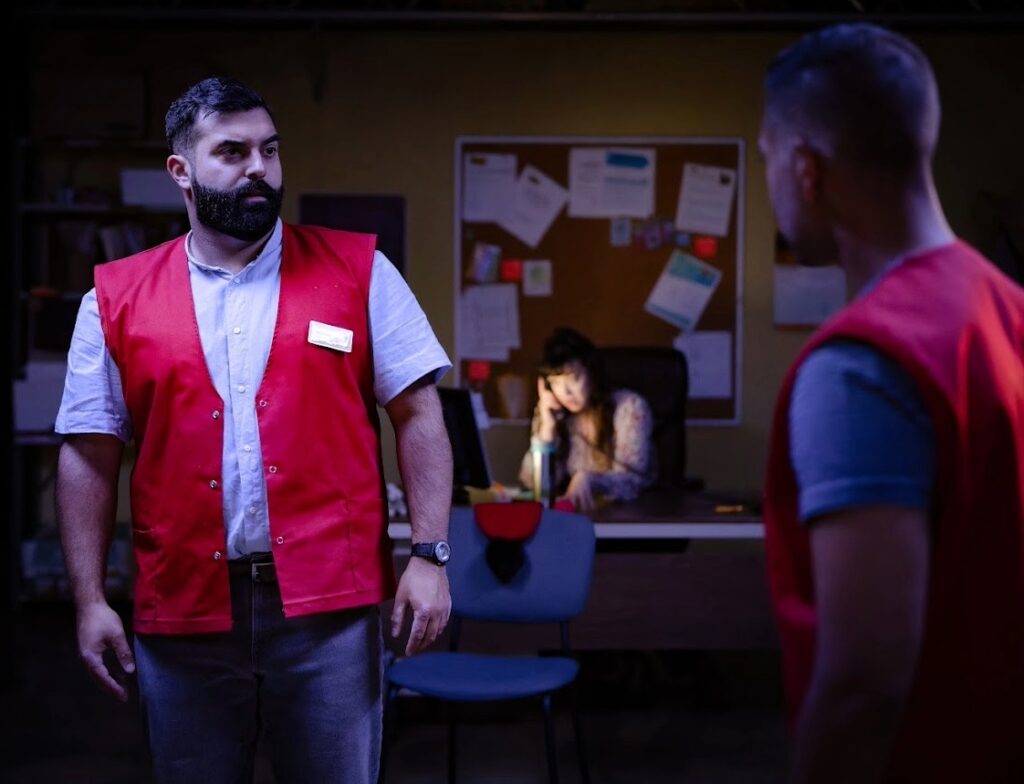
Throughout the play, the actors sustain a high level of tension. It never quite breaks. Catharsis feels blocked, intentionally or not, and any kind of closure is off the table. Though their witty back-and-forths might hog your attention, it was the bodily acting of the performers that most impressed me. Keith Fernandez (Lasantha) wields the tiny leaps, frantic turns, and excited finger-waves of a highly irritated person trying to clear his name. Matt Lacas (Rishan) subtly, but with distinction, changes how he holds himself depending on who is in the room. Natasha Fragant (Tiffany) wears her exasperation on her shoulders, even as her stance often reveals her perceived superiority. When alliances start to shift, you can feel the rearrangement.
It is fitting that such a corporeal production is, at bottom, about wounds.
For example, Lesantha remarkably takes Rishan’s side against Tiffany when she claims his Tamil sentence “sounded angry.” Lesantha literally turns on Tiffany, and through the combined body-language of the actors, the stage’s center of gravity seems to teeter towards her. When she has left the room, Lesantha and Rishan mime out a dance together, opening themselves physically to each other. The fight scenes, choreographed by Zack Counsil, felt like something out of Mortal Kombat. The air was super-charged, and the audience gasped at the major blows.
It is fitting that such a corporeal production is, at bottom, about wounds. A handful of sobering moments break away from the play’s darkly comic tone. “The Sri Lankan Civil War,” Abeyratne writes on the show’s program, “haunts this stage.” Rishan tells stories about his family’s experience leaving Sri Lanka, about the pain and indignity they suffered at refugee camps and Canadian detention centers. The balance between solemnity and humour is a careful one. Abeyratne believes that “we need plays that mourn the dead while honoring the wounds of those who are still living.”
His plea is realized at Teesri Duniya Theatre, an independent and intercultural institution that produces “politically relevant plays” to “propel positive change.” Soicher, for instance, continues their mandate of all-women directors. The play’s run includes a pay-what-you-can show, an enforced-masking show, two shows followed by Talkback sessions, and a free clothes-mending workshop inspired by the thrift store setting. Though White Lion, Brown Tiger is a fierce battle with no real closure, it gestures to a very real need: the space to tell stories, and the chance to repair.
White Lion, Brown Tiger premiered at Teesri Duniya Theatre in Montreal on October 14. The show runs until October 23, including a pay-what-you-can show on the 21st, and a mandatory masked show on the 22nd (masks provided).

